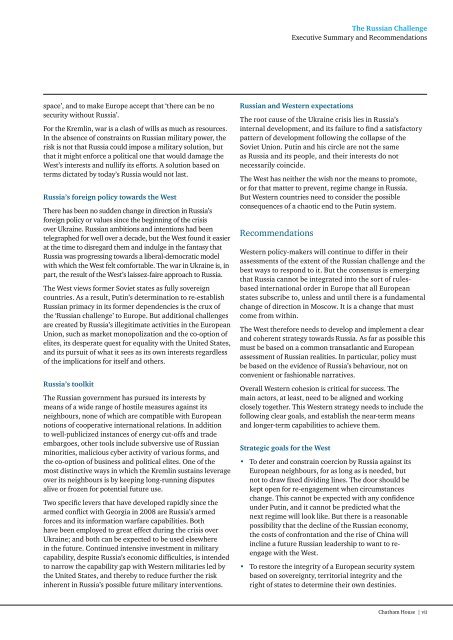The Russian Challenge
20150605RussianChallengeGilesHansonLyneNixeySherrWoodUpdate
20150605RussianChallengeGilesHansonLyneNixeySherrWoodUpdate
- No tags were found...
Create successful ePaper yourself
Turn your PDF publications into a flip-book with our unique Google optimized e-Paper software.
<strong>The</strong> <strong>Russian</strong> <strong>Challenge</strong><br />
Executive Summary and Recommendations<br />
space’, and to make Europe accept that ‘there can be no<br />
security without Russia’.<br />
For the Kremlin, war is a clash of wills as much as resources.<br />
In the absence of constraints on <strong>Russian</strong> military power, the<br />
risk is not that Russia could impose a military solution, but<br />
that it might enforce a political one that would damage the<br />
West’s interests and nullify its efforts. A solution based on<br />
terms dictated by today’s Russia would not last.<br />
Russia’s foreign policy towards the West<br />
<strong>The</strong>re has been no sudden change in direction in Russia’s<br />
foreign policy or values since the beginning of the crisis<br />
over Ukraine. <strong>Russian</strong> ambitions and intentions had been<br />
telegraphed for well over a decade, but the West found it easier<br />
at the time to disregard them and indulge in the fantasy that<br />
Russia was progressing towards a liberal-democratic model<br />
with which the West felt comfortable. <strong>The</strong> war in Ukraine is, in<br />
part, the result of the West’s laissez-faire approach to Russia.<br />
<strong>The</strong> West views former Soviet states as fully sovereign<br />
countries. As a result, Putin’s determination to re-establish<br />
<strong>Russian</strong> primacy in its former dependencies is the crux of<br />
the ‘<strong>Russian</strong> challenge’ to Europe. But additional challenges<br />
are created by Russia’s illegitimate activities in the European<br />
Union, such as market monopolization and the co-option of<br />
elites, its desperate quest for equality with the United States,<br />
and its pursuit of what it sees as its own interests regardless<br />
of the implications for itself and others.<br />
Russia’s toolkit<br />
<strong>The</strong> <strong>Russian</strong> government has pursued its interests by<br />
means of a wide range of hostile measures against its<br />
neighbours, none of which are compatible with European<br />
notions of cooperative international relations. In addition<br />
to well-publicized instances of energy cut-offs and trade<br />
embargoes, other tools include subversive use of <strong>Russian</strong><br />
minorities, malicious cyber activity of various forms, and<br />
the co-option of business and political elites. One of the<br />
most distinctive ways in which the Kremlin sustains leverage<br />
over its neighbours is by keeping long-running disputes<br />
alive or frozen for potential future use.<br />
Two specific levers that have developed rapidly since the<br />
armed conflict with Georgia in 2008 are Russia’s armed<br />
forces and its information warfare capabilities. Both<br />
have been employed to great effect during the crisis over<br />
Ukraine; and both can be expected to be used elsewhere<br />
in the future. Continued intensive investment in military<br />
capability, despite Russia’s economic difficulties, is intended<br />
to narrow the capability gap with Western militaries led by<br />
the United States, and thereby to reduce further the risk<br />
inherent in Russia’s possible future military interventions.<br />
<strong>Russian</strong> and Western expectations<br />
<strong>The</strong> root cause of the Ukraine crisis lies in Russia’s<br />
internal development, and its failure to find a satisfactory<br />
pattern of development following the collapse of the<br />
Soviet Union. Putin and his circle are not the same<br />
as Russia and its people, and their interests do not<br />
necessarily coincide.<br />
<strong>The</strong> West has neither the wish nor the means to promote,<br />
or for that matter to prevent, regime change in Russia.<br />
But Western countries need to consider the possible<br />
consequences of a chaotic end to the Putin system.<br />
Recommendations<br />
Western policy-makers will continue to differ in their<br />
assessments of the extent of the <strong>Russian</strong> challenge and the<br />
best ways to respond to it. But the consensus is emerging<br />
that Russia cannot be integrated into the sort of rulesbased<br />
international order in Europe that all European<br />
states subscribe to, unless and until there is a fundamental<br />
change of direction in Moscow. It is a change that must<br />
come from within.<br />
<strong>The</strong> West therefore needs to develop and implement a clear<br />
and coherent strategy towards Russia. As far as possible this<br />
must be based on a common transatlantic and European<br />
assessment of <strong>Russian</strong> realities. In particular, policy must<br />
be based on the evidence of Russia’s behaviour, not on<br />
convenient or fashionable narratives.<br />
Overall Western cohesion is critical for success. <strong>The</strong><br />
main actors, at least, need to be aligned and working<br />
closely together. This Western strategy needs to include the<br />
following clear goals, and establish the near-term means<br />
and longer-term capabilities to achieve them.<br />
Strategic goals for the West<br />
• To deter and constrain coercion by Russia against its<br />
European neighbours, for as long as is needed, but<br />
not to draw fixed dividing lines. <strong>The</strong> door should be<br />
kept open for re-engagement when circumstances<br />
change. This cannot be expected with any confidence<br />
under Putin, and it cannot be predicted what the<br />
next regime will look like. But there is a reasonable<br />
possibility that the decline of the <strong>Russian</strong> economy,<br />
the costs of confrontation and the rise of China will<br />
incline a future <strong>Russian</strong> leadership to want to reengage<br />
with the West.<br />
• To restore the integrity of a European security system<br />
based on sovereignty, territorial integrity and the<br />
right of states to determine their own destinies.<br />
Chatham House | vii


